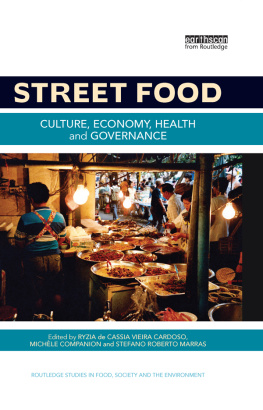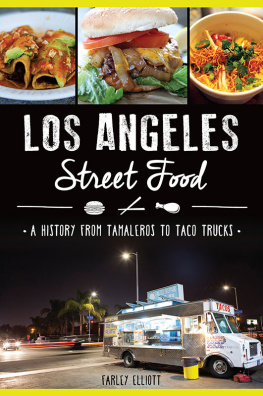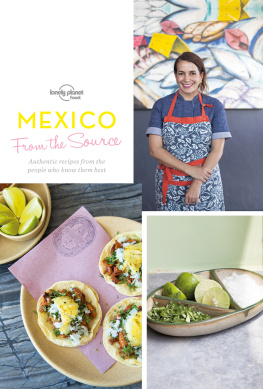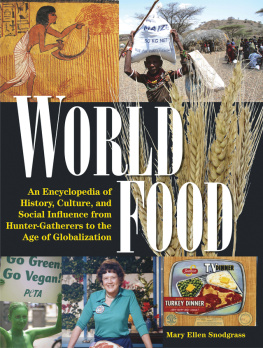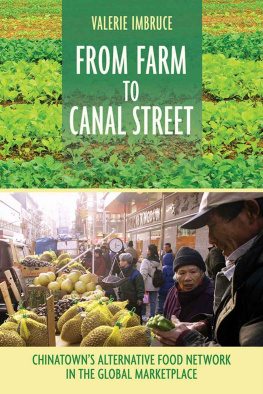Street Food
Prepared foods, for sale in streets, squares, or markets, are ubiquitous around the world and throughout history. This volume is one of the first to provide a comprehensive social science perspective on street food, illustrating its immense cultural diversity and economic significance, both in developing and developed countries.
Key issues addressed include: policy, regulation, and governance of street food and vendors; production and trade patterns ranging from informal subsistence to modern forms of enterprise; the key role played by female vendors; historical roots and cultural meanings of selling and eating food in the street; food safety and nutrition issues. Many chapters provide case studies from specific cities in different regions of the world. These include North America (Atlanta, Philadelphia, Portland, Toronto, Vancouver), Central and South America (Bogot, Buenos Aires, La Paz, Lima, Mexico City, Montevideo, Santiago, Salvador da Bahia), Asia (Bangkok, Dhaka, Penang), Africa (Accra, Abidjan, Bamako, Freetown, Mozambique), and Europe (Amsterdam).
Ryzia de Cassia Vieira Cardoso is an Associate Professor at the School of Nutrition, Federal University of Bahia, Brazil.
Michle Companion is an Associate Professor of Sociology at the University of Colorado, Colorado Springs, USA.
Stefano Roberto Marras is a sociologist and the president of Street Food SQUARE, a non-profit organization based in Milan, Italy.
First published 2014
by Routledge
2 Park Square, Milton Park, Abingdon, Oxon OX14 4RN
and by Routledge
711 Third Avenue, New York, NY 10017
Routledge is an imprint of the Taylor & Francis Group, an informa business
2014 Ryzia de Cassia Vieira Cardoso, Michle Companion, and Stefano Roberto Marras, selection and editorial material; individual chapters, the contributors
The right of the editors to be identified as the authors of the editorial material, and of the authors for their individual chapters, has been asserted in accordance with sections 77 and 78 of the Copyright, Designs and Patents Act 1988.
All rights reserved. No part of this book may be reprinted or reproduced or utilised in any form or by any electronic, mechanical, or other means, now known or hereafter invented, including photocopying and recording, or in any information storage or retrieval system, without permission in writing from the publishers.
Trademark notice: Product or corporate names may be trademarks or registered trademarks, and are used only for identification and explanation without intent to infringe.
British Library Cataloguing-in-Publication Data
A catalogue record for this book is available from the British Library
Library of Congress Cataloging-in-Publication Data
Street food : culture, economy, health and governance / edited by Ryzia de Cassia Vieira Cardoso, Michle Companion, Stefano Roberto Marras.
pages cm -- (Routledge studies in food, society and environment)
Includes bibliographical references and index.
1. International cooking. 2. Street food. 3. Street vendors--Social aspects. 4. Street vendors--Government policy. 5. Food--Crosscultural studies. 6. Food--Social aspects. 7. Food service--Safety measures. I. Cardoso, Ryzia de Cassia Vieira. II. Companion, Michle.
III. Marras, Stefano Roberto.
TX725.A1.S6776 2014
641.59--dc23
2014002667
ISBN: 978-1-138-02368-0 (hbk)
ISBN: 978-1-315-77625-5 (ebk)
Typeset in Bembo
by Saxon Graphics Ltd, Derby
Contents
STEFANO R. MARRAS
KATHERINE BURNETT AND LENORE NEWMAN
BENJAMIN ETZOLD
TIANA BAKI HAYDEN
FREEK JANSSENS
ALEXANDRA PILL
PAOLO CORVO
GIORGIA F. NICOL AND MOHAMED AG BENDECH
MICHLE COMPANION
LILIAN MIRANDA MAGALHES AND LGIA AMPARO DA SILVA SANTOS
BRONWYN ISAACS
M. SHAHRIM ABDUL KARIM AND NURHASMILAALISA ABDUL HALIM
LUISA FERNANDA TOBAR VARGAS AND GINA TATIANA BARBOSA MUOZ
RYZIA DE CASSIA VIEIRA CARDOSO, GIZANE RIBEIRO DE SANTANA, AND TALITA FERREIRA DANTAS GUIMARES
RYZIA DE CASSIA VIEIRA CARDOSO, SANDRA MARIA CHAVES DOS SANTOS AND EDLEUZA OLIVEIRA SILVA
MAX BLANCK, RENATA MIRULLA AND MAURICIO ROSALES
The editors
Ryziade Cassia Vieira Cardoso (ryzia@ufba.br) is an Associate Professor at the School of Nutrition, Federal University of Bahia, Brazil. She received a degree in Nutrition from the Federal University of Bahia (1984), a Masters (1992), and a Doctoral degree (1999) in Food Science and Technology from the Federal University of Viosa. She has long-standing research experience in the area of street food, focusing on health surveillance, female vendors, child labor, and consumption practices. She is the head of the Research Group on Food Safety and Informal Food Trade (Grupo de Pesquisa Segurana Alimentar e Comrcio Informal de AlimentosSACIA), Federal University of Bahia. The group has the purpose of promoting interdisciplinary studies on street food, involving nutritionists, anthropologists, and economists, in cooperation with local authorities, with the aim of contributing to the development of health, social, and economic conditions in the informal food trade in Brazil and in particular in Salvador, Bahia. Cardoso has authored numerous articles, among which are Street food on the coast of Salvador, Bahia, Brazil: a study from the socioeconomic and food safety perspectives (2013), Quail egg safety and trade on the beaches of Salvador (BA): a study from a child labor perspective (2013), Street food and intervention: strategies and proposals to the developing world (2009), and Alimentos de rua na Bahia: o perfil do consumidor em Salvador e a caracterizao do comrcio em Mutupe (2008).
Michle Companion (mcompani@uccs.edu) is an Associate Professor at the University of Colorado, Colorado Springs, USA. She received her PhD (2003) in Sociology from the University of Arizona. She has spent the last several years focusing on Native American reservation nutritional dynamics, including the impacts of low-income diets on overall health and on reservation food security issues. She has also been documenting tribal participation in the food sovereignty movement to reclaim cultural aspects of traditional foods. More recently, she has been focusing on urban Indian populations. Again, the issues of food security and long-term health implications frame her focus. In addition to urban food security, she has been looking at cultural barriers to healthy eating among low-income urban Indian populations. Dr. Companion has also worked extensively as a food and livelihood security consultant to international humanitarian aid organizations. She has worked extensively across Africa in countries such as Malawi, Mozambique, Angola, South Africa, Ethiopia, Egypt, and Somalia, with organizations which include Save the ChildrenUS, USAID, Counterpart International, FEWSNET, International Relief and Development, and Global Food and Nutrition, Inc. Her current work in this area focuses on the expansion of food security indicators to increase local sensitivity to food crisis triggers. Her most recent publications include Urban and Peri-Urban Cultivation in Northern Mozambique: Impacts on Food Security among Female Street Food Vendors (2012); Commodities and Competition: the economic marginalization of female food vendors in northern Mozambique (2010), and Information Commodification and Social Capital in Local Street Markets (2010).
Stefano Roberto Marras (marras.stefano@gmail.com) is a sociologist, photographer, and video-maker. He is currently the president of Street Food SQUARE (www.streetfoodsquare.org), a non-profit organization aimed at the development and promotion of best practice in street food trade, consumption, and governance worldwide. He received his PhD in Urban Studies in 2008 from the University of Milano-Bicocca, where he conducted research until 2013. Over the past three years, he has devoted himself to street food studies, starting on a project on South American metropolises in partnership with Milan Expo 2015. Since 2012, he has coordinated the Street Food Global Network (www.streetfoodglobalnetwork.net), the international online forum of specialists on the subject. He is currently producing the documentary film,

